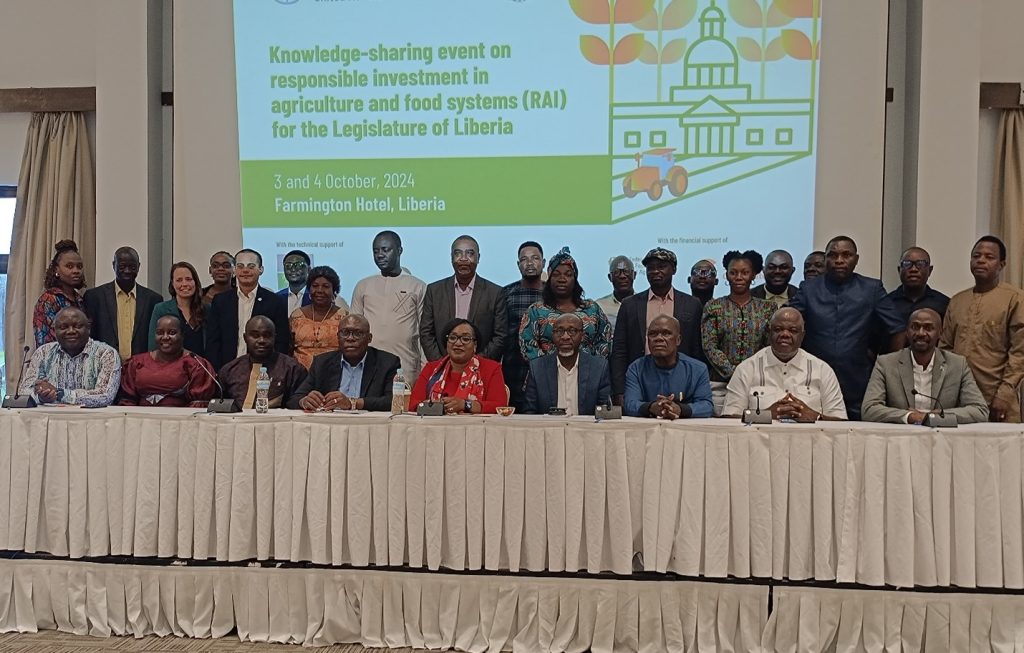In early October 2023, the Food and Agriculture Organization of the United Nations (FAO) convened a knowledge-sharing workshop in Harbel, Liberia, aimed at promoting Responsible Agricultural Investment (RAI) and enhancing food systems. The event, which spanned two days and took place at the Farmington Hotel, gathered 25 key participants, including members of both Houses of the Liberian legislature, such as Representatives and Senators, as well as technical staff. It also included representatives from Liberia’s RAI Multistakeholder Platform (RAI-MSP), comprising officials from various ministries dedicated to improving the agricultural and food investment landscape in the nation. This initiative underscores the pressing need for informed legislative support to propel agricultural investments that align with sustainable development goals in Liberia.
The agricultural sector in Liberia has faced numerous challenges since the end of the civil crisis, despite the nation’s wealth of natural resources. The FAO notes that many citizens who rely on agriculture for their livelihood continue to experience hardships, highlighting the urgent need for responsible investments that prioritize food security, human rights, and environmental sustainability. The FAO promotes alignment with the Committee on World Food Security’s Principles for Responsible Investment in Agriculture and Food Systems to ensure that investments yield community benefits and contribute to long-term sustainable growth. The workshop aims to close the knowledge gap among lawmakers regarding these principles and the role they play in revitalizing Liberia’s agricultural sector.
A pivotal objective of the workshop was to empower lawmakers to become advocates for responsible agricultural investments. Legislators are understood to be critical players in shaping political agendas, enacting relevant laws, and ensuring governmental accountability. FAO Representative in Liberia, Ms. Bintia Stephen Tchicaya, emphasized the essential role of legislative involvement in establishing a robust framework that nurtures responsible investments while discouraging those with negative socio-environmental repercussions. She pointed out that over the past five years, the FAO has collaborated closely with stakeholders through the RAI-MSP to enhance government capacities and ensure that agricultural investments tangibly benefit Liberia’s populace and environment.
In a concerted effort to bolster the legislative push for responsible agricultural investments, the FAO, in partnership with the International Institute for Sustainable Development, has published the “Practical Handbook on Responsible Investment in Agriculture and Food Systems.” This handbook provides key policy recommendations, practical tools, and global examples that parliamentarians can utilize to support their initiatives. Senator Wellington Geevon-Smith, chair of the Senate Committee on Agriculture, expressed gratitude for the workshop, emphasizing the unique perspectives of lawmakers who have agricultural backgrounds, which allows them to identify challenges and brainstorm practical solutions related to responsible investments in the sector.
The workshop also presented an opportunity for legislators like Maryland County Representative P. Mike Jurry to discuss innovative approaches to agricultural investment. Jurry stressed that viewing agriculture through a developmental lens can significantly alter investment strategies in Liberia. The knowledge-sharing platform aims to foster collaboration among legislators, promoting a vision where agricultural investments contribute to broader development goals. He expressed optimism that this event marks the beginning of an important transition toward recognizing agriculture as a pivotal development strategy in the country.
By addressing the myriad challenges facing Liberia’s agricultural sector, the workshop serves as a foundational step in promoting a legislative environment conducive to responsible agricultural investment. The overarching aim is to enhance food security and drive sustainable development in Liberia, ultimately generating long-term economic advantages for its citizens. Through collective efforts and collaborative dialogue, the FAO and participating lawmakers are keen to instill a more robust and resilient agricultural framework that benefits both the environment and the economy, aligning with Liberia’s aspirations for sustainable growth.














